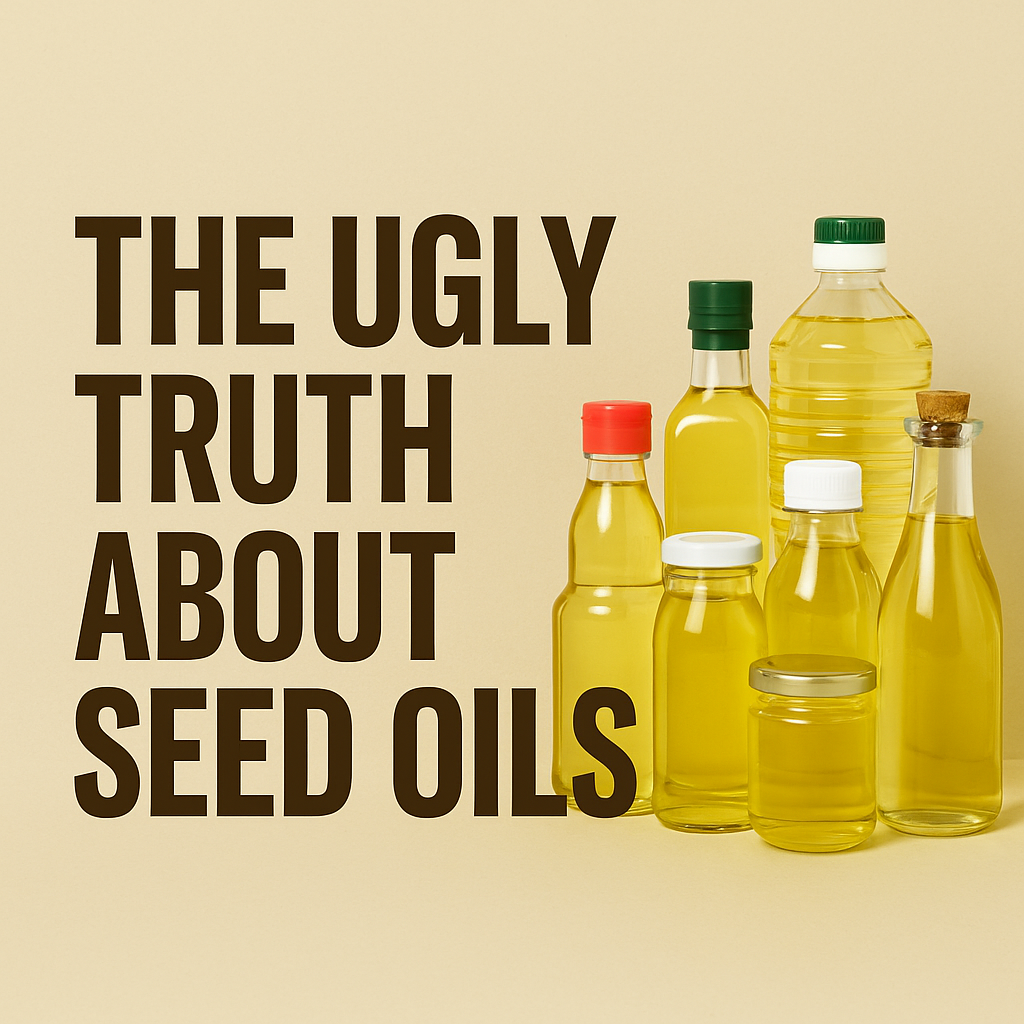Let’s be real—if there’s one thing hiding in your pantry that’s quietly messing with your metabolism, hormones, and inflammation levels, it’s seed oils.
They’re in almost everything: salad dressings, chips, “healthy” protein bars, frozen foods, even your favorite organic granola. The crazy part? Most people still think they’re healthy.
So let’s break it down. No fluff. Just facts—and what to use instead if you’re serious about your health.

What Even Are Seed Oils?
Seed oils come from things you were never supposed to get oil out of in the first place:
- Canola (aka rapeseed)
- Soybean
- Corn
- Sunflower
- Safflower
- Cottonseed
- Grapeseed
- Rice bran
These aren’t like pressing olives for olive oil. Seed oils require massive heat, chemical solvents like hexane, bleaching, and deodorizing just to make them edible.
If that doesn’t set off alarms, it should.
The Problem: It’s Not Fat, It’s This Fat
We need fat. That’s not the issue. But the type of fat matters.
Seed oils are packed with linoleic acid, an omega-6 polyunsaturated fat that becomes highly unstable in your body. It oxidizes easily, turns into toxic byproducts, and starts damaging your cells from the inside out.
Here’s what science is linking excessive linoleic acid intake to:
- Chronic inflammation
- Obesity and metabolic dysfunction
- Accelerated aging
- Insulin resistance
- Even increased risk of heart disease—yep, the opposite of what they told us
“We replaced real food fats like butter and tallow with industrial sludge—and look where that got us.” —Paul Saladino, MD
They Stay in Your Fat Cells for Over a Year
Here’s the part nobody talks about: PUFAs (polyunsaturated fats) don’t just pass through your system.
Your body stores them in your fat tissue for up to 600 days. That means if you’ve been eating seed oils for years (most people have), they’re still in there, messing with your metabolism and immune system long after you stop using them.
This isn’t a cheat-day situation. This is long-term baggage.
“Heart Healthy”? That’s a Marketing Myth
Let’s call it out: the whole “heart-healthy” label is based on outdated, cherry-picked studies and decades of food industry lobbying.
Seed oils lower cholesterol? Sure, but at what cost? Newer studies show they increase oxidized LDL, mess with your endothelial function (the lining of your blood vessels), and make inflammation worse—not better.
Your body needs stable, saturated fats, not chemically altered omega-6 bombs.
What to Use Instead (Your Body Will Thank You)
Here’s what our ancestors used—and what your cells prefer:
- Beef tallow (my go-to for high heat cooking)
- Ghee or butter (if you tolerate dairy)
- Duck fat
- Coconut oil
- Extra virgin olive oil (for low-heat use)
- Avocado oil (cold-pressed only—not the stuff mixed with canola)
Basically, if your great-grandparents cooked with it, it’s probably a safe bet.
If you’re aiming for real health—not just the illusion of it—it starts with what you’re cooking in.
Ditch the seed oils. Toss the processed salad dressings. Swap those “clean label” bars that sneak in canola or sunflower oil.
Once you cut them out, you’ll notice your skin, energy, digestion, and mental clarity all shift. No exaggeration.
We’ve been fed a lie. But once you see it, you can’t unsee it. The good news? You’re in full control now.
Leave a Reply